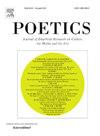教育质量判断的分层:关于学生和家长评价中社会经济差异的两个因子调查实验的启示
IF 2
2区 社会学
0 LITERATURE
引用次数: 0
摘要
行为主体利用文化知识来驾驭制度是对不平等现象的一个重要解释。然而,由于难以获得文化知识,教育社会学家往往依赖文化的陈述形式来衡量对不平等现象的解释。本研究以智利为例,利用因子调查实验来评估教育质量评价原则或所谓的 "游戏判断 "的分层情况,从而为教育不平等研究做出贡献。通过实验操纵不同的教学和学校资源特征,并将其呈现给具有代表性和概率性的家长和小学生样本,以衡量他们对教育质量的评价原则。研究结果表明,社会地位较高的家长和学生以及来自私立学校的家长和学生倾向于对教育质量进行更严格的评价,并将更强的效果归因于小故事的特征,这表明了文化知识的分层。因此,本研究通过检验关于教育不平等解释的核心理论命题之一,为文化社会学、教育社会学和分层研究做出了贡献。本文章由计算机程序翻译,如有差异,请以英文原文为准。
Stratification of educational quality judgments: Insights from two factorial survey experiments on socioeconomic differences in student and parent evaluations
The use that agents do of cultural knowledge to navigate institutions is a major explanation of inequalities. Nevertheless, the difficulties accessing culture knowledge have led sociologists of education to often rely on declarative forms of culture to gauge explanations on inequalities. Based on the case of Chile, this study contributes to educational inequality research by using factorial survey experiments to assess the stratification of evaluative principles of educational quality or what is termed "judgments of the game." Different teaching and school resources features were experimentally manipulated and presented to representative and probabilistic samples of parents and primary school students to measure their evaluative principles of educational quality. Findings show that socially advantaged parents and students, and from private schools, tend to evaluate educational quality more critically and attribute stronger effects to vignette features, suggesting cultural knowledge stratification. Thus, this study contributes to cultural sociology, sociology of education, and stratification research by testing one of the central theoretical propositions on the explanations of educational inequalities.
求助全文
通过发布文献求助,成功后即可免费获取论文全文。
去求助
来源期刊

Poetics
Multiple-
CiteScore
4.00
自引率
16.00%
发文量
77
期刊介绍:
Poetics is an interdisciplinary journal of theoretical and empirical research on culture, the media and the arts. Particularly welcome are papers that make an original contribution to the major disciplines - sociology, psychology, media and communication studies, and economics - within which promising lines of research on culture, media and the arts have been developed.
 求助内容:
求助内容: 应助结果提醒方式:
应助结果提醒方式:


